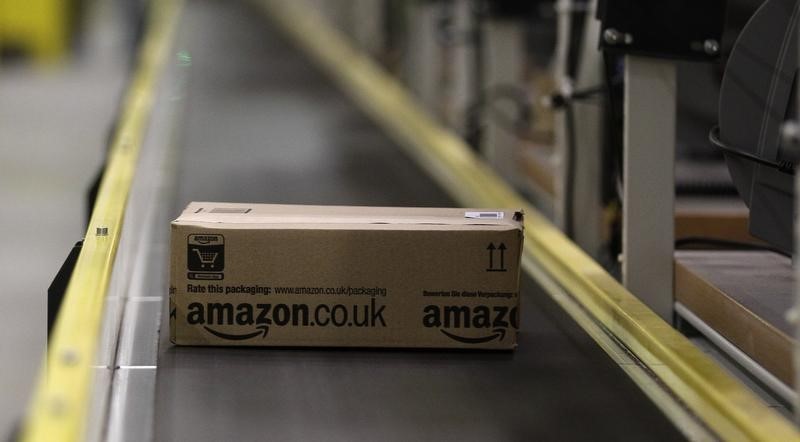By David Randall
NEW YORK (Reuters) - For many years, investors have been very tolerant as Amazon (NASDAQ:AMZN).com has sacrificed profits for rapid growth in sales and as it built new businesses. That patience may finally be wearing thin.
The average large-cap fund that holds Amazon has 1.4 percent of its assets in the stock, down 23 percent from this time last year, according to the latest available Lipper data.
There are 116 funds with more than $1 billion (0.66 billion pounds) under management that have either reduced or sold all of their holdings in the Internet retailer over the past 12 months. They include such well-known names as Fidelity Contrafund, Washington Mutual Investors Fund, Touchstone Sands Select Growth fund and the T. Rowe Price Growth fund.
Some investors and analysts said that such a drop in fund ownership - in a period when Amazon's shares have been climbing - suggests that large-cap managers increasingly see the company as over-valued, particularly at a time when it is spending tons of cash branching off into everything from selling its own smartphone to producing a Woody Allen TV series.
Reuters contacted the 25 mutual fund managers who sold the greatest number of Amazon shares over the last year, and none of them were willing to be quoted by name for this story.
One fund manager who sold out of his position in the company over the last six months said: "This has the potential to be a phenomenally profitable company, but the shares are rallying on no new news, in our opinion, so we thought we might as well step to the side for a while."
This is not the first time that investors have bemoaned Amazon's predilection for plowing money back into expanding the company's reach rather than realizing it as profit. Jeff Bezos, the chief executive of Amazon, has long said that he is more interested in satisfying customers to earn their long-term business than in short-term earnings measures and has never set a date by which the company expects to turn a consistent profit.
The company did not respond to a request for comment for this story.
VALUATION GAP
What strikes some investors as different this time around is the widening divergence between Amazon's valuation and that of its large technology peers like Apple Inc (NASDAQ:AAPL) and Google Inc (NASDAQ:GOOGL), both of which are growing at similar rates.
Amazon trades at 16.2 times its book value. Apple, by comparison, trades at 6.5 times its book value, according to Thomson Reuters data. Google, another company which has expanded beyond its core business into lines as far afield as driverless cars, is valued at 3.4 times its book value. The others made big profits last year while Amazon was unprofitable.
While Google has posted more than $68 billion in profits before taxes between 2010-2014, Amazon has netted just $2.6 billion over the same time frame, according to Thomson Reuters data.
The cashflow is a better gauge of how the company is doing, according to Robert S. Peck, an analyst at SunTrust Robinson Humphrey, who downgraded the company to "neutral" on March 9 because he views the shares as overvalued. He estimates its free cash flow from operations will climb to $8.9 billion this fiscal year from $3.4 billion in 2010, yet nearly all of that additional cash is being used to expand into businesses like grocery delivery or web services.
The company's shares have rallied nearly 26 percent for the year to date after its fourth quarter results beat Wall Street estimates. Sales continue to grow at an above-market pace, with analysts expecting it to post 13.7 percent revenue growth in the first quarter of 2015 when it reports results on Thursday.
Its share price is up approximately 167 percent over the past five years, nearly 90 percentage points more than the benchmark Standard & Poor's 500 index's gain. The stock trades at a price-to-earnings ratio of 414, based on 2015 earnings estimates, against 17.1 for the S&P 500, according to StarMine data.
Overall, Wall Street seems to be giving the company time. "Management has earned the benefit of the doubt," said Mark Oelschlager, co-portfolio manager of the White Oak Select Growth fund who has owned the stock for the last 8 years. "Their core retail business remains to us the jewel of the company, and they have this huge platform that would be difficult for any competitor to replace."
Just 2 of the 45 analysts tracked by Reuters who cover the company have a sell rating on its shares, while 27 recommend that clients actively buy shares.
"The market overall is in a bull market and it's giving this company a pass," said Chaim Siegel, an analyst at Elazar Advisors who downgraded the company to the equivalent of "sell" on April 2. While high now, the company's shares will likely plunge at any sign that the market's overall direction is turning negative, he added.
Bill Smead, portfolio manager of the $1.1 billion Smead Value fund, said he does not own shares of Amazon despite his fund's overall bet that consumer spending will climb. Ironically, that is because he expects the company's shares to tumble once it finally does show consistent profits - a sign that its growth days are over.

"As long as it's a spectacular sales growth story they're fine, but as soon as they actually generate earnings their valuation is going to be based on that" rather than investor's trust in Amazon's strategy, he said. "That's when your mortality kicks into gear."